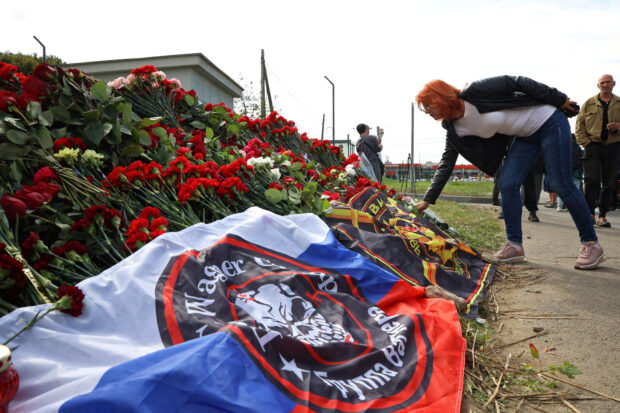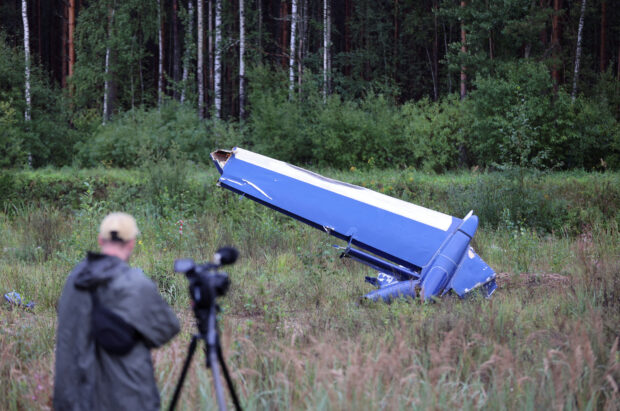
A woman visits a makeshift memorial near former PMC Wagner Centre, associated with the founder of the Wagner Group, Yevgeny Prigozhin, in Saint Petersburg, Russia August 24, 2023. REUTERS/Anastasia Barashkova
Kuzhenkino, Russia — Russian President Vladimir Putin broke his silence on Thursday on the plane crash a day earlier that killed infamous mercenary boss Yevgeny Prigozhin and other senior members of the Wagner paramilitary group.
In televised comments Putin offered his “sincere condolences to the families of all the victims”, describing the crash as a “tragedy”. As well as Prigozhin, the other nine people on board also died.
Putin’s statement was the first official confirmation that the Wagner boss had been killed.
Wednesday evening’s crash took place exactly two months after Prigozhin led a rebellion against Moscow’s top military brass, considered by some observers to have been the biggest threat to Putin’s long rule.
Although Moscow opened an investigation into violations of air traffic rules, investigators have been silent since, as speculation of a possible assassination has grown.
Ukraine President Volodymyr Zelensky insisted Kyiv had nothing to do with the incident. “I think everyone knows who this concerns,” he added, in what appeared to be a reference to Putin.
A ‘common cause’
Moscow had initially said only that the 62-year-old Prigozhin was listed as a passenger on the flight, without confirming his death.
But when Putin broke his silence on Thursday he paid a qualified tribute to the mercenary boss and the paramilitary group he led.
“I knew Prigozhin for a very long time, since the early 90s. He was a man of complicated fate, and he made serious mistakes in his life, but he achieved the right results,” Putin said.
In an address to Russians during the Wagner rebellion on June 23-24 in which he warned against “civil war”, Putin had called Prigozhin — once his ally — a “traitor”.
But on Thursday, he said the Wagner members who had died in the crash had made a “significant contribution” to Moscow’s offensive in Ukraine.
They had shared a common cause, Putin said, adding: “We remember that, we know that, and we will not forget that.”

A cameraman films a wreckage of the private jet linked to Wagner mercenary chief Yevgeny Prigozhin near the crash site in the Tver region, Russia, August 24, 2023. REUTERS/Marina Lystseva
‘Reasonable doubts’
Some Western leaders expressed doubts that the crash had been an accident.
“There’s not much that happens in Russia that Putin’s not behind,” said US President Joe Biden, after having said he did not know what happened.
France saw “reasonable doubts” about the crash, while Germany said it followed a pattern of “unclarified” fatalities in Russia.
German Foreign Minister Annalena Baerbock appeared to say it was suspicious that “a disgraced former confidant of Putin suddenly, literally falls from the sky two months after he attempted a mutiny”.
Even influential pro-Kremlin figures, such as state television personality and Putin ally Margarita Simonyan, seemed to suggest that it could have been an assassination.
“Among the versions that are being discussed (about the crash) is that it was staged. But personally, I’m leaning towards the more obvious one,” she said on social media.
Russia’s aviation authority published the names of those on board the Embraer private jet late on Wednesday.
It included Prigozhin and his right-hand man, Dmitry Utkin, a shadowy figure who managed Wagner’s operations and allegedly served in Russian military intelligence.
Russian police patrolled the crash site near the village of Kuzhenkino, some 350 kilometres (220 miles) north of Moscow in the Tver region. Some masked men carried rifles.
One woman living near Kuzhenkino said her neighbour had heard a roar and saw “sparkling from the plane”, accompanied by fire.
“A neighbour ran up to me with shaking hands and when we went to the window I saw only one mushroom (a cloud from the explosion), a black cloud,” she said in video published by state-run news agency RIA Novosti.
‘Real patriot’
Video verified by AFP from the scene appeared to show the Embraer Legacy plane engulfed in a plume-like column of white smoke as it fell from the sky.
The Flightradar24 tracker website said the plane flying from Moscow to Saint Peterburg appeared on their radar until the last 30 seconds and descended “dramatically” at around 15:20 GMT.
Some Wagner-linked Telegram channels initially suggested the plane had been shot down by Russian air defence, on a day when Kyiv struck Russia with more drone attacks.
Prigozhin appeared to enjoy some popularity in Russia.
He appealed to nationalist-leaning Russians — also suspicious of the army leadership during the Ukraine offensive — who embraced his tough-guy style.
Some even speculated that he would take part in the 2024 presidential election, which is expected to extend Putin’s rule until at least 2030.
“He was one of the few real patriots in our country,” Pavel Zakharov said as he laid flowers at Wagner’s headquarters in Saint Petersburg.
Many Russians eagerly awaited Prigozhin’s outspoken, often expletive-laden social media videos, a sharp contrast to the tightly controlled narrative of Russian officials.
Ukrainians hope death ‘true’
Wagner offices were still operating and even recruiting in Russia after Prigozhin’s rebellion, which saw his men take over a military headquarters in the southern city of Rostov-on-Don and march on Moscow.
In Siberia, a region from where Wagner recruited heavily, people also laid flowers at the mercenary company’s office in Novosibirsk.
But in Ukraine, where Wagner fighters were known for their exceptional brutality — including extrajudicial killings of their own men — many welcomed the news of Prigozhin’s death.
Prigozhin recruited tens of thousands of Russian convicts to fight in Ukraine, often thrown into the front line.
Wagner’s future without Prigozhin — including its involvement in African conflicts — remained unclear.
The warlord’s won future had been uncertain since a deal with Belarus that ended Wagner’s brief rebellion.
Under that deal, the Kremlin “guaranteed” that Prigozhin would be allowed to live in Belarus — Russia’s neighbour and a Kremlin ally.
Minsk has for weeks played up the presence of the Wagner fighters on its territory, saying it had set up camps for them.

